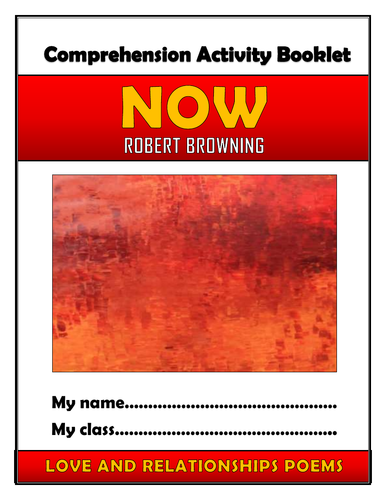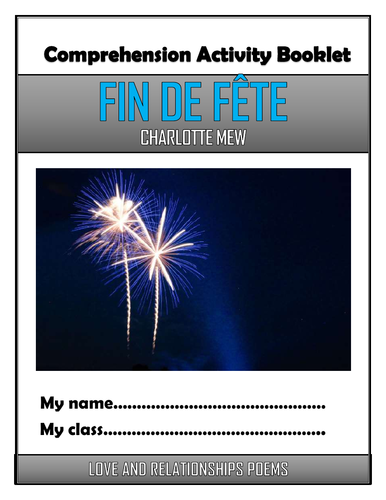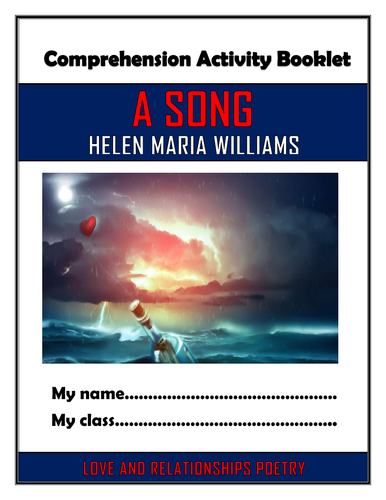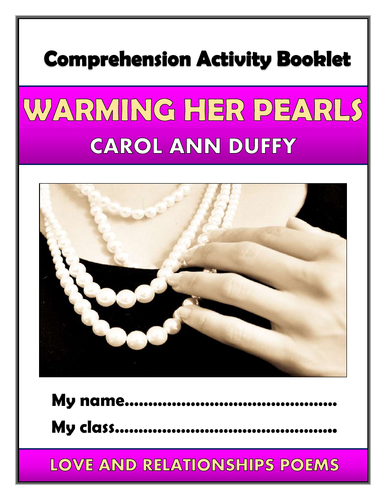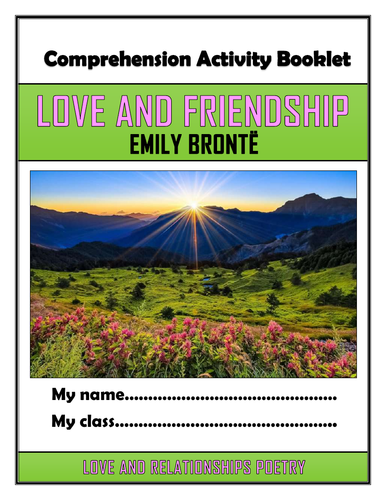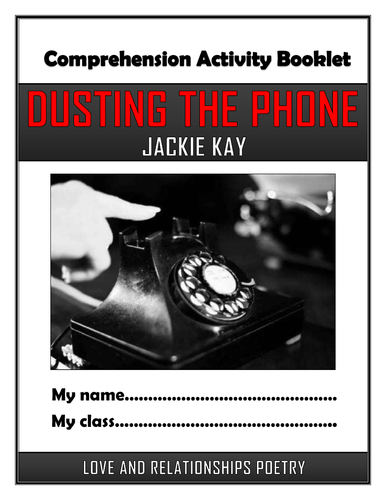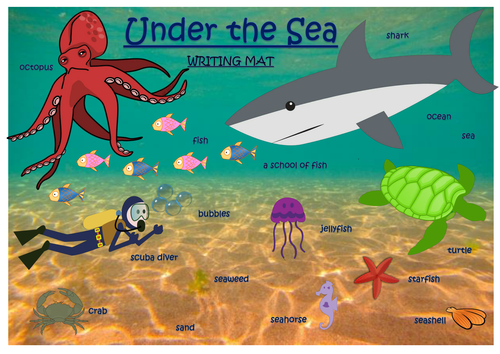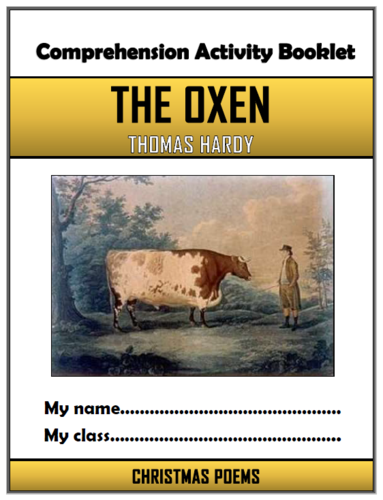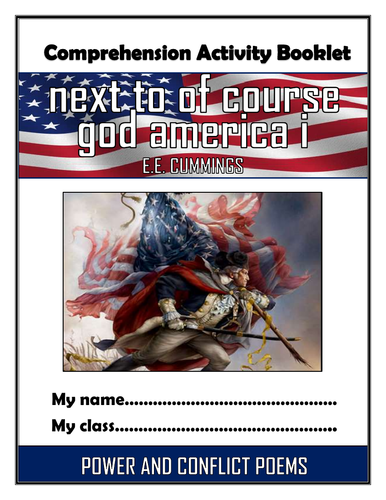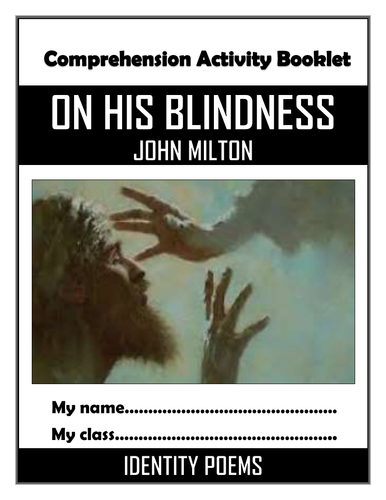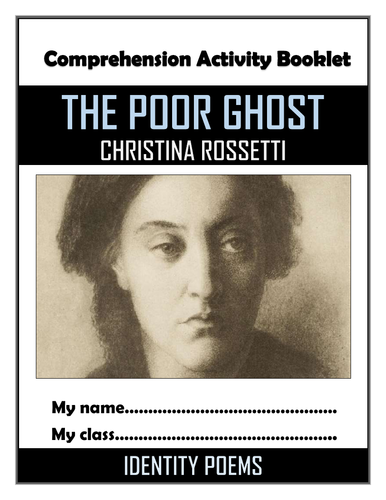
3k+Uploads
1969k+Views
2279k+Downloads
English

Ode on a Grecian Urn - Comprehension Activities Booklet!
This 16-page resource booklet contains a wide range of challenging and engaging comprehension activities for use throughout the reading of John Keats’ poem 'Ode on a Grecian Urn.’ Teachers have found the activities particularly useful throughout teaching, or for revision or guided reading sessions. Students have found these resources extremely engaging, and it is clearly highlighted within each task regarding which assessment strands the task is designed to demonstrate.
It is provided in both Word (to allow for easy editing) and PDF (to ensure for consistency of formatting between computers).
Activities within the booklet include (amongst many others):
‘Analysing Context’ - helping students to ‘Show understanding of the relationships between texts and the contexts in which they were written.’
‘Analysing Subject Matter, Language and Structure’ - to help students to ‘Analyse the language, form and structure used by a writer to create meanings and effects, using relevant subject terminology where appropriate.’
‘Diary Entry’ - to help students to ‘Use a range of vocabulary and sentence structures for clarity, purpose and effect, with accurate spelling and punctuation. Make an informed personal response, recognising that other responses to a text are possible and evaluating these.’
‘The Speaker’ - to help students to ‘Read, understand and respond to texts. Students should be able to: maintain a critical style and develop an informed personal response use textual references, including quotations, to support and illustrate interpretations.’

Cold Knap Lake - Gillian Clarke - Comprehension Activities Booklet!
This 16-page resource booklet contains a wide range of challenging and engaging comprehension activities for use throughout the reading of Gillian Clarke’s poem 'Cold Knap Lake.’ Teachers have found the activities particularly useful throughout teaching, or for exam revision or guided reading sessions. They are perfect for aiding the progress of students towards meeting the key English Literature assessment objectives - suitable for all examining bodies. Students have found these resources extremely engaging, and it is clearly highlighted within each task regarding which assessment strands the task is designed to demonstrate.
It is provided in both Word (to allow for easy editing) and PDF (to ensure for consistency of formatting between computers).
Activities within the booklet include (amongst many others):
‘Analysing Context’ - helping students to ‘Show understanding of the relationships between texts and the contexts in which they were written.’
‘Analysing Subject Matter, Language and Structure’ - to help students to ‘Analyse the language, form and structure used by a writer to create meanings and effects, using relevant subject terminology where appropriate.’
‘Diary Entry’ - to help students to ‘Use a range of vocabulary and sentence structures for clarity, purpose and effect, with accurate spelling and punctuation. Make an informed personal response, recognising that other responses to a text are possible and evaluating these.’
‘The Speaker’ - to help students to ‘Read, understand and respond to texts. Students should be able to: maintain a critical style and develop an informed personal response use textual references, including quotations, to support and illustrate interpretations.’

Now - Robert Browning - Comprehension Activities Booklet!
This 16-page resource booklet contains a wide range of challenging and engaging comprehension activities for use throughout the reading of Robert Browning’s poem 'Now.’ Teachers have found them particularly useful throughout teaching, or for exam revision or guided reading sessions. They are perfect for aiding the progress of students towards meeting the key English Literature assessment objectives - suitable for all examining bodies. Students have found these resources extremely engaging, and it is clearly highlighted within each task regarding which assessment strands the task is designed to demonstrate.
It is provided in both Word (to allow for easy editing) and PDF (to ensure for consistency of formatting between computers).
Activities within the booklet include (amongst many others):
‘Analysing Context’ - helping students to ‘Show understanding of the relationships between texts and the contexts in which they were written.’
‘Analysing Subject Matter, Language and Structure’ - to help students to ‘Analyse the language, form and structure used by a writer to create meanings and effects, using relevant subject terminology where appropriate.’
‘Diary Entry’ - to help students to ���Use a range of vocabulary and sentence structures for clarity, purpose and effect, with accurate spelling and punctuation. Make an informed personal response, recognising that other responses to a text are possible and evaluating these.’
‘The Speaker’ - to help students to ‘Read, understand and respond to texts. Students should be able to: maintain a critical style and develop an informed personal response use textual references, including quotations, to support and illustrate interpretations.’

Fin de Fête Comprehension Activities Booklet!
This 16-page resource booklet contains a wide range of challenging and engaging comprehension activities for use throughout the reading of Charlotte Mew’s poem 'Fin de Fête.’ Teachers have found them particularly useful throughout teaching, or for exam revision or guided reading sessions. They are perfect for aiding the progress of students towards meeting the key English Literature assessment objectives - suitable for all examining bodies. Students have found these resources extremely engaging, and it is clearly highlighted within each task regarding which assessment strands the task is designed to demonstrate.
It is provided in both Word (to allow for easy editing) and PDF (to ensure for consistency of formatting between computers).
Activities within the booklet include (amongst many others):
‘Analysing Context’ - helping students to ‘Show understanding of the relationships between texts and the contexts in which they were written.’
‘Analysing Subject Matter, Language and Structure’ - to help students to ‘Analyse the language, form and structure used by a writer to create meanings and effects, using relevant subject terminology where appropriate.’
‘Diary Entry’ - to help students to ‘Use a range of vocabulary and sentence structures for clarity, purpose and effect, with accurate spelling and punctuation. Make an informed personal response, recognising that other responses to a text are possible and evaluating these.’
‘The Speaker’ - to help students to ‘Read, understand and respond to texts. Students should be able to: maintain a critical style and develop an informed personal response use textual references, including quotations, to support and illustrate interpretations.’

A Song - Helen Maria Williams - Comprehension Activities Booklet!
This 16-page resource booklet contains a wide range of challenging and engaging comprehension activities for use throughout the reading of Helen Maria Williams’ poem ‘A Song.’ Teachers have found them particularly useful throughout teaching, or for exam revision or guided reading sessions. They are perfect for aiding the progress of students towards meeting the key English Literature assessment objectives - suitable for all examining bodies. Students have found these resources extremely engaging, and it is clearly highlighted within each task regarding which assessment strands the task is designed to demonstrate.
It is provided in both Word (to allow for easy editing) and PDF (to ensure for consistency of formatting between computers).
Activities within the booklet include (amongst many others):
‘Analysing Context’ - helping students to ‘Show understanding of the relationships between texts and the contexts in which they were written.’
‘Analysing Subject Matter, Language and Structure’ - to help students to ‘Analyse the language, form and structure used by a writer to create meanings and effects, using relevant subject terminology where appropriate.’
‘Diary Entry’ - to help students to ‘Use a range of vocabulary and sentence structures for clarity, purpose and effect, with accurate spelling and punctuation. Make an informed personal response, recognising that other responses to a text are possible and evaluating these.’
‘The Speaker’ - to help students to ‘Read, understand and respond to texts. Students should be able to: maintain a critical style and develop an informed personal response use textual references, including quotations, to support and illustrate interpretations.’

Warming Her Pearls Comprehension Activities Booklet!
This 16-page resource booklet contains a wide range of challenging and engaging comprehension activities for use throughout the reading of Carol Ann Duffy’s poem 'Warming Her Pearls.’ Teachers have found them particularly useful throughout teaching, or for exam revision or guided reading sessions. They are perfect for aiding the progress of students towards meeting the key English Literature assessment objectives - suitable for all examining bodies. Students have found these resources extremely engaging, and it is clearly highlighted within each task regarding which assessment strands the task is designed to demonstrate.
It is provided in both Word (to allow for easy editing) and PDF (to ensure for consistency of formatting between computers).
Activities within the booklet include (amongst many others):
‘Analysing Context’ - helping students to ‘Show understanding of the relationships between texts and the contexts in which they were written.’
‘Analysing Subject Matter, Language and Structure’ - to help students to ‘Analyse the language, form and structure used by a writer to create meanings and effects, using relevant subject terminology where appropriate.’
‘Diary Entry’ - to help students to ‘Use a range of vocabulary and sentence structures for clarity, purpose and effect, with accurate spelling and punctuation. Make an informed personal response, recognising that other responses to a text are possible and evaluating these.’
‘The Speaker’ - to help students to ‘Read, understand and respond to texts. Students should be able to: maintain a critical style and develop an informed personal response use textual references, including quotations, to support and illustrate interpretations.’

Love and Friendship Comprehension Activities Booklet!
This 16-page resource booklet contains a wide range of challenging and engaging comprehension activities for use throughout the reading of Charlotte Brontë’s poem ‘Love and Friendship.’ Teachers have found them particularly useful throughout teaching, or for exam revision or guided reading sessions. They are perfect for aiding the progress of students towards meeting the key English Literature assessment objectives - suitable for all examining bodies. Students have found these resources extremely engaging, and it is clearly highlighted within each task regarding which assessment strands the task is designed to demonstrate.
It is provided in both Word (to allow for easy editing) and PDF (to ensure for consistency of formatting between computers).
Activities within the booklet include (amongst many others):
‘Analysing Context’ - helping students to ‘Show understanding of the relationships between texts and the contexts in which they were written.’
‘Analysing Subject Matter, Language and Structure’ - to help students to ‘Analyse the language, form and structure used by a writer to create meanings and effects, using relevant subject terminology where appropriate.’
‘Diary Entry’ - to help students to ‘Use a range of vocabulary and sentence structures for clarity, purpose and effect, with accurate spelling and punctuation. Make an informed personal response, recognising that other responses to a text are possible and evaluating these.’
‘The Speaker’ - to help students to ‘Read, understand and respond to texts. Students should be able to: maintain a critical style and develop an informed personal response use textual references, including quotations, to support and illustrate interpretations.’

Dusting the Phone Comprehension Activities Booklet!
This 16-page resource booklet contains a wide range of challenging and engaging comprehension activities for use throughout the reading of Jackie Kay’s poem ‘Dusting the Phone.’ Teachers have found them particularly useful throughout teaching, or for exam revision or guided reading sessions. They are perfect for aiding the progress of students towards meeting the key English Literature assessment objectives - suitable for all examining bodies. Students have found these resources extremely engaging, and it is clearly highlighted within each task regarding which assessment strands the task is designed to demonstrate.
It is provided in both Word (to allow for easy editing) and PDF (to ensure for consistency of formatting between computers).
Activities within the booklet include (amongst many others):
‘Analysing Context’ - helping students to ‘Show understanding of the relationships between texts and the contexts in which they were written.’
‘Analysing Subject Matter, Language and Structure’ - to help students to ‘Analyse the language, form and structure used by a writer to create meanings and effects, using relevant subject terminology where appropriate.’
‘Diary Entry’ - to help students to ‘Use a range of vocabulary and sentence structures for clarity, purpose and effect, with accurate spelling and punctuation. Make an informed personal response, recognising that other responses to a text are possible and evaluating these.’
‘The Speaker’ - to help students to ‘Read, understand and respond to texts. Students should be able to: maintain a critical style and develop an informed personal response use textual references, including quotations, to support and illustrate interpretations.’

The Sorrow of True Love Comprehension Activities Booklet!
This 16-page resource booklet contains a wide range of challenging and engaging comprehension activities for use throughout the reading of Edward Thomas’ poem ‘The Sorrow of True Love.’ Teachers have found them particularly useful throughout teaching, or for exam revision or guided reading sessions. They are perfect for aiding the progress of students towards meeting the key English Literature assessment objectives - suitable for all examining bodies. Students have found these resources extremely engaging, and it is clearly highlighted within each task regarding which assessment strands the task is designed to demonstrate.
It is provided in both Word (to allow for easy editing) and PDF (to ensure for consistency of formatting between computers).
Activities within the booklet include (amongst many others):
‘Analysing Context’ - helping students to ‘Show understanding of the relationships between texts and the contexts in which they were written.’
‘Analysing Subject Matter, Language and Structure’ - to help students to ‘Analyse the language, form and structure used by a writer to create meanings and effects, using relevant subject terminology where appropriate.’
‘Diary Entry’ - to help students to ‘Use a range of vocabulary and sentence structures for clarity, purpose and effect, with accurate spelling and punctuation. Make an informed personal response, recognising that other responses to a text are possible and evaluating these.’
‘The Speaker’ - to help students to ‘Read, understand and respond to texts. Students should be able to: maintain a critical style and develop an informed personal response use textual references, including quotations, to support and illustrate interpretations.’

Mr Popper's Penguins - Whole Class Reading Session!
This whole class reading session aims to develop children’s comprehension skills through reading the opening two chapters of Florence and Richard Atwater’s ‘Mr Popper’s Penguins.’
The resource pack includes the extract and all of the activities for the session, which the class are guided through via a comprehensive PowerPoint presentation. The reading is followed by a series of activities aiming to develop children’s retrieval, explanation, inference, prediction and summarising skills. It also contains a vocabulary check immediately after the extract is read to clarify any unfamiliar/ difficult language.
The tasks are comprised of quick-check questions, solo thinking, pair/ group discussions and deeper thinking activities. The text for reading is hyperlinked at the bottom of the first slide.
The session is best suited for children in years 3-4, although with only a few minor adaptations it could feasibly be used with slightly older and younger classes. The session is also suitable for home/ remote learning.

Alfred the Great - Non-Fiction Whole Class Reading Session!
This whole class reading session aims to build their understanding of Alfred the Great, whilst simultaneously developing their reading comprehension skills.
The resource pack includes the full text (adapted from a ‘Britannica’ article) and all of the activities for the session, which the class are guided through via a comprehensive PowerPoint presentation. The reading is followed by a series of activities aiming to develop children’s retrieval, explanation, inference, prediction and summarising skills. It also contains a vocabulary check immediately after the text is read to clarify any unfamiliar/ difficult language.
The tasks are comprised of quick-check questions, solo thinking, pair/ group discussions and deeper thinking activities.
The session is best suited for children in years 3-4, although with minor adaptations it could feasibly be used with slightly older or younger year groups. This resource is suitable for home/ remote learning. These resources are also suitable for home/ remote learning.

Writing Mats - World Landscapes!
These original writing mats offer a varied and visually engaging way for students to independently increase the depth and breadth of their imaginative writing. Designed on A3, they simply need to printed and given to students before they begin creative writing tasks. They could also be used as colourful word posters to brighten up your classroom and familiarise children with new vocabulary.
The benefits of using these resources as writing mats is twofold: Firstly, the vibrant, wide-ranging, and student-friendly landscapes offer students a wealth of new writing stimuli. Secondly, the simple concrete noun labels save substantial learning time, as the effort that students may have previously exerted deliberating over the spellings of the common nouns is vastly reduced. Instead, students have the time to focus upon the teacher's intended key writing focus areas.
This resource pack contains 12 completely original, comprehensive landscapes from around the world, including:
-The Rainforest
-Space
-Under the Sea
-The Poles
-Mountain
-Forest
-Safari
-Desert
-Farm
-Beach
-Park
-Town
Every image used in this resource pack is licensed for commercial use, and all are cited on a separate document within the pack.
This pack can either be purchased alone, or alongside the 'Imaginations Landscapes' writing mats for just 1 pound more.

The Oxen - Thomas Hardy - Comprehension Activities Booklet!
This 16-page resource booklet contains a wide range of challenging and engaging comprehension activities for use throughout the reading of Thomas Hardy’s poem ‘The Oxen.’ Teachers have found the activities particularly useful throughout teaching, or for exam revision or guided reading sessions. They are perfect for aiding the progress of students towards meeting the key English Literature assessment objectives - suitable for all examining bodies. Students have found these resources extremely engaging, and it is clearly highlighted within each task regarding which assessment strands the task is designed to demonstrate.
It is provided in both Word (to allow for easy editing) and PDF (to ensure for consistency of formatting between computers).
Activities within the booklet include (amongst many others):
‘Analysing Context’ - helping students to ‘Show understanding of the relationships between texts and the contexts in which they were written.’
‘Analysing Subject Matter, Language and Structure’ - to help students to ‘Analyse the language, form and structure used by a writer to create meanings and effects, using relevant subject terminology where appropriate.’
‘Diary Entry’ - to help students to ‘Use a range of vocabulary and sentence structures for clarity, purpose and effect, with accurate spelling and punctuation. Make an informed personal response, recognising that other responses to a text are possible and evaluating these.’
‘The Speaker’ - to help students to ‘Read, understand and respond to texts. Students should be able to: maintain a critical style and develop an informed personal response use textual references, including quotations, to support and illustrate interpretations.’

So, We'll Go No More A Roving - Comprehension Activities Booklet!
This 16-page resource booklet contains a wide range of challenging and engaging comprehension activities for use throughout the reading of Lord Byron’s 'So, We’ll Go No More A Roving.’ Teachers have found the activities particularly useful throughout teaching, or for revision or guided reading sessions. Students have found these resources extremely engaging, and it is clearly highlighted within each task regarding which assessment strands the task is designed to demonstrate.
It is provided in both Word (to allow for easy editing) and PDF (to ensure for consistency of formatting between computers).
Activities within the booklet include (amongst many others):
‘Analysing Context’ - helping students to ‘Show understanding of the relationships between texts and the contexts in which they were written.’
‘Analysing Subject Matter, Language and Structure’ - to help students to ‘Analyse the language, form and structure used by a writer to create meanings and effects, using relevant subject terminology where appropriate.’
‘Diary Entry’ - to help students to ‘Use a range of vocabulary and sentence structures for clarity, purpose and effect, with accurate spelling and punctuation. Make an informed personal response, recognising that other responses to a text are possible and evaluating these.’
‘The Speaker’ - to help students to ‘Read, understand and respond to texts. Students should be able to: maintain a critical style and develop an informed personal response use textual references, including quotations, to support and illustrate interpretations.’

Fare Thee Well - Comprehension Activities Booklet!
This 16-page resource booklet contains a wide range of challenging and engaging comprehension activities for use throughout the reading of Lord Byron’s 'Fare Thee Well.’ Teachers have found the activities particularly useful throughout teaching, or for revision or guided reading sessions. Students have found these resources extremely engaging, and it is clearly highlighted within each task regarding which assessment strands the task is designed to demonstrate.
It is provided in both Word (to allow for easy editing) and PDF (to ensure for consistency of formatting between computers).
Activities within the booklet include (amongst many others):
‘Analysing Context’ - helping students to ‘Show understanding of the relationships between texts and the contexts in which they were written.’
‘Analysing Subject Matter, Language and Structure’ - to help students to ‘Analyse the language, form and structure used by a writer to create meanings and effects, using relevant subject terminology where appropriate.’
‘Diary Entry’ - to help students to ‘Use a range of vocabulary and sentence structures for clarity, purpose and effect, with accurate spelling and punctuation. Make an informed personal response, recognising that other responses to a text are possible and evaluating these.’
‘The Speaker’ - to help students to ‘Read, understand and respond to texts. Students should be able to: maintain a critical style and develop an informed personal response use textual references, including quotations, to support and illustrate interpretations.’

The Sparrow's Nest - Comprehension Activities Booklet!
This 16-page resource booklet contains a wide range of challenging and engaging comprehension activities for use throughout the reading of William Wordsworth’s poem 'The Sparrow’s Nest.’ The tasks draw on English Literature assessment objectives - suitable for all examining bodies - clearly highlighted within each task.
The booklet is provided in both Word (to allow for easy editing) and PDF (to ensure for consistency of formatting between computers).
Activities within the booklet include (amongst many others):
‘Analysing Context’ - helping students to ‘Show understanding of the relationships between texts and the contexts in which they were written.’
‘Analysing Subject Matter, Language and Structure’ - to help students to ‘Analyse the language, form and structure used by a writer to create meanings and effects, using relevant subject terminology where appropriate.’
‘Diary Entry’ - to help students to ‘Use a range of vocabulary and sentence structures for clarity, purpose and effect, with accurate spelling and punctuation. Make an informed personal response, recognising that other responses to a text are possible and evaluating these.’
‘The Speaker’ - to help students to ‘Read, understand and respond to texts. Students should be able to: maintain a critical style and develop an informed personal response use textual references, including quotations, to support and illustrate interpretations.’

next to of course god america i Comprehension Activities Booklet!
This 16-page resource booklet contains a wide range of challenging and engaging comprehension activities for use throughout the reading of E.E. Cummings’ poem 'next to of course god america i.’ They are perfect for aiding the progress of students learning poetry either in KS3 and KS4 in preparation for poetry/unseen poetry at GCSE, as the tasks draw on English Literature assessment objectives - suitable for all examining bodies - it is clearly highlighted within each task regarding which assessment strands the task is designed to demonstrate.
The booklet is provided in both Word (to allow for easy editing) and PDF (to ensure for consistency of formatting between computers).
Activities within the booklet include (amongst many others):
‘Analysing Context’ - helping students to ‘Show understanding of the relationships between texts and the contexts in which they were written.’
‘Analysing Subject Matter, Language and Structure’ - to help students to ‘Analyse the language, form and structure used by a writer to create meanings and effects, using relevant subject terminology where appropriate.’
‘Diary Entry’ - to help students to ‘Use a range of vocabulary and sentence structures for clarity, purpose and effect, with accurate spelling and punctuation. Make an informed personal response, recognising that other responses to a text are possible and evaluating these.’
‘The Speaker’ - to help students to ‘Read, understand and respond to texts. Students should be able to: maintain a critical style and develop an informed personal response use textual references, including quotations, to support and illustrate interpretations.’

On His Blindness - Knowledge Organiser/ Revision Mat!
This 16-page resource booklet contains a wide range of challenging and engaging comprehension activities for use throughout the reading of John Milton’s poem 'On His Blindness’ They are perfect for aiding the progress of students learning poetry either in KS3 and KS4 in preparation for poetry/unseen poetry at GCSE, as the tasks draw on English Literature assessment objectives - suitable for all examining bodies - it is clearly highlighted within each task regarding which assessment strands the task is designed to demonstrate.
The booklet is provided in both Word (to allow for easy editing) and PDF (to ensure for consistency of formatting between computers).
Activities within the booklet include (amongst many others):
‘Analysing Context’ - helping students to ‘Show understanding of the relationships between texts and the contexts in which they were written.’
‘Analysing Subject Matter, Language and Structure’ - to help students to ‘Analyse the language, form and structure used by a writer to create meanings and effects, using relevant subject terminology where appropriate.’
‘Diary Entry’ - to help students to ‘Use a range of vocabulary and sentence structures for clarity, purpose and effect, with accurate spelling and punctuation. Make an informed personal response, recognising that other responses to a text are possible and evaluating these.’
‘The Speaker’ - to help students to ‘Read, understand and respond to texts. Students should be able to: maintain a critical style and develop an informed personal response use textual references, including quotations, to support and illustrate interpretations.’

The Poor Ghost Comprehension Activities Booklet!
This 16-page resource booklet contains a wide range of challenging and engaging comprehension activities for use throughout the reading of Christina Rossetti’s poem 'The Poor Ghost.’ They are perfect for aiding the progress of students learning poetry either in KS3 and KS4 in preparation for poetry/unseen poetry at GCSE, as the tasks draw on English Literature assessment objectives - suitable for all examining bodies - it is clearly highlighted within each task regarding which assessment strands the task is designed to demonstrate.
The booklet is provided in both Word (to allow for easy editing) and PDF (to ensure for consistency of formatting between computers).
Activities within the booklet include (amongst many others):
‘Analysing Context’ - helping students to ‘Show understanding of the relationships between texts and the contexts in which they were written.’
‘Analysing Subject Matter, Language and Structure’ - to help students to ‘Analyse the language, form and structure used by a writer to create meanings and effects, using relevant subject terminology where appropriate.’
‘Diary Entry’ - to help students to ‘Use a range of vocabulary and sentence structures for clarity, purpose and effect, with accurate spelling and punctuation. Make an informed personal response, recognising that other responses to a text are possible and evaluating these.’
‘The Speaker’ - to help students to ‘Read, understand and respond to texts. Students should be able to: maintain a critical style and develop an informed personal response use textual references, including quotations, to support and illustrate interpretations.’

Oscar Wilde - The Garden of Eros Comprehension Activities Booklet!
This 16-page resource booklet contains a wide range of challenging and engaging comprehension activities for use throughout the reading of Oscar Wilde’s poem 'The Garden of Eros.’ They are perfect for aiding the progress of students learning poetry either in KS3 and KS4 in preparation for poetry/unseen poetry at GCSE, as the tasks draw on English Literature assessment objectives - suitable for all examining bodies - it is clearly highlighted within each task regarding which assessment strands the task is designed to demonstrate.
The booklet is provided in both Word (to allow for easy editing) and PDF (to ensure for consistency of formatting between computers).
Activities within the booklet include (amongst many others):
‘Analysing Context’ - helping students to ‘Show understanding of the relationships between texts and the contexts in which they were written.’
‘Analysing Subject Matter, Language and Structure’ - to help students to ‘Analyse the language, form and structure used by a writer to create meanings and effects, using relevant subject terminology where appropriate.’
‘Diary Entry’ - to help students to ‘Use a range of vocabulary and sentence structures for clarity, purpose and effect, with accurate spelling and punctuation. Make an informed personal response, recognising that other responses to a text are possible and evaluating these.’
‘The Speaker’ - to help students to ‘Read, understand and respond to texts. Students should be able to: maintain a critical style and develop an informed personal response use textual references, including quotations, to support and illustrate interpretations.’



